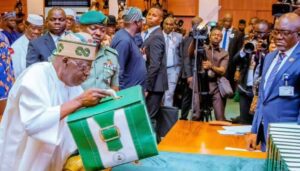


Inflation rate hits 32.70% on petrol price hike after 2-month decline
CPPE urges government action to curb rising prices
By Seun Ibiyemi and Esther Agbo
Nigeria’s persistent battle with inflation has reignited, with headline inflation to 32.70 percent in September on petrol price hike, marking a sharp reversal from the two-month decline witnessed earlier.
According to the National Bureau of Statistics, Consumer’s Price Index increased to 32.70 percent in September 2024 from 32.15 percent in August 2024.
In the same vein month-on-month inflation rate for September 2024 went up 0.30 percent to 2.52 percent, from percent recorded in August 2024.
Nigeria’s annual headline inflation dipped in July for the first time in 19 months to 33.40 percent and further down to 32.15 percent in August. Creating the closest gap between the interest rate and inflation this year.
Nigeria’s annual headline inflation dipped in July for the first time in 19 months to 33.40 percent and further down to 32.15 percent in August. Creating the closest gap between the interest rate and inflation this year.
The increase in consumer price index is despite the Monetary Policy Committee 50 basis point hike in interest rate to 27.25 percent, the fifth consecutive hike this year to battle Nigeria’s sticky inflation.
In September, Nigerians experienced an upward review of PMS prices from N597.00 to N855.00. Last week NNPC increased petrol prices from N950/Litre to N998/Litre in Lagos and as high as N1,003 in northeastern states, the second increment in two months as petrol price deregulation takes full effect.
Analysts at Financial Derivatives Company Limited, an economic think tank had projected that headline inflation will increase marginally by 0.22 percent to 32.37 percent on the back of the new petrol price, coupled with exchange rate volatility and floods in northern Nigeria, which will undermine agricultural production.
Food inflation, a significant driver of overall inflation, rose to 37.7 percent in September, from 30.64 percent in September 2023.
Eggs have become inaccessible for several Nigerian homes who cannot afford to pay N6000 to purchase a crate of the poultry products.
The average price of a crate of eggs has hit N6,000 in various parts of Nigeria, from less than N3000 per crate 12-15 months ago.
Already strained Nigerians disposable income has been put under fresh pressure as the price of transportation and other commodities skyrockets off the increment.
The major driver of the rising price is the skyrocketing cost of inputs, particularly feed, maize and soybeans. High petrol prices have also been blamed for the price jump.
Core inflation, which excludes volatile agricultural produce and energy prices, rose to 27.43 percent in September 2024, from 21.84 percent in September 2023.Indermit Gill, senior vice president World Bank Group, said at the 30th National Economic Summit on Monday that to protect the poor and maintain competitiveness, the central bank must stay focused on inflation.
“It should resist the lure of short-term capital inflows that might push up the Naira’s value too quickly and crimp non-oil growth. It should rebuild foreign exchange reserves instead as a cushion against oil price volatility,” Gill said.
The second thing is to help every vulnerable household cope with still higher inflation. The government is rolling out a large-scale targeted temporary cash transfer program that has already reached between four and five million households.
…As CPPE urges government action to curb rising prices
In a swift response, the Centre for the Promotion of Private Enterprise (CPPE) has raised concerns about the resurgence of inflationary pressures in Nigeria, despite recent government efforts to stabilise the economy.
According to the Director and CEO of the CPPE, Dr. Muda Yusuf, inflation surged to 32.7 percent in September 2024, compared to 32.15 percent in August, a rise of 0.55 percent. Month-on-month inflation also saw a marginal increase of 0.30 percent between August and September.
There was also a marginal increase of 0.30 percent in month-on-month inflation between August and September.
Food inflation, which had decelerated in recent months, climbed to 37.77 percent in September, up from 37.52 per cent in August.
Dr. Yusuf attributed the inflation spike to a number of persistent supply-side challenges, including a depreciating exchange rate, soaring fuel prices, rising transportation costs, and supply chain disruptions.
He also highlighted the impact of climate change, particularly flooding, and insecurity in farming communities, which have worsened food production.
“The reality is that the dynamics driving inflation are yet to be effectively subdued,” Yusuf said, noting that these factors have severely affected both production costs and profitability for businesses.
Manufacturers, in particular, are finding it difficult to pass on higher costs to consumers due to weak purchasing power, resulting in eroded profit margins.
Dr. Yusuf urged the government to take immediate steps to address the structural issues inhibiting productivity and production in the real sector.
He recommended the introduction of concessionary import duties on intermediate products to ease the cost pressures faced by industrialists, alongside efforts to address energy and exchange rate challenges.
“It will be very difficult to tame inflation if we do not substantially fix power, logistics and forex and security issues,” Yusuf noted, though he admitted that these areas require long-term solutions.
He expressed hope that the proposed economic stabilisation measures currently before the National Assembly would address some of these concerns.
Yusuf also stressed the importance of subnational governments in tackling food insecurity and inflation.
He called on state governments to improve rural infrastructure, particularly roads, to reduce transportation costs and facilitate better access to markets, which would help ease inflationary pressures in the agricultural sector



